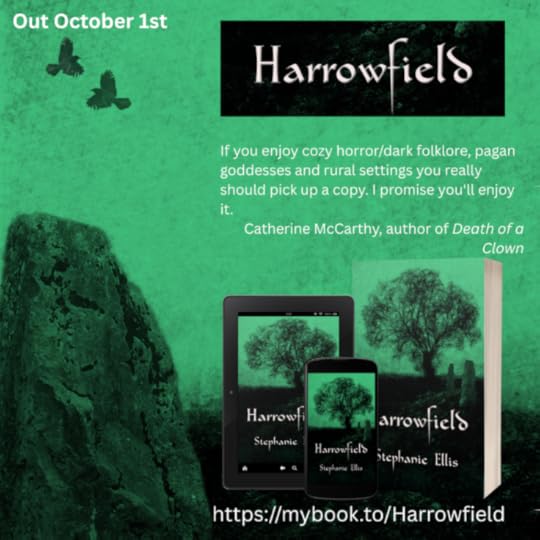Harrowfield’s Rheda – Who is She?
So much of our past is obscure and it seems remarkable to me, that in many instances, one or two references to some being or practise centuries ago can give rise to a whole set of beliefs which people now regard as canon. When you start to dig into the history, look at those primary sources, the in-depth studies of academics, then you realise how much is often wishful thinking on our part. We want, we believe, these things to be true because everybody says so. I read widely and a favourite author is Professor Ronald Hutton. He has written a number of books which I would recommend to anyone interested in folklore, occult, and pagan practises – he has debunked so much of what I thought of as true, leaving only a vague ‘possibly’ in its place.
But it doesn’t matter if what you eventually discover isn’t that much, that it doesn’t conform to what you thought you knew because that gives you, as a writer, a huge amount of scope to play with characters and beliefs in your own way. And this is what I have done with pagan goddess, Rheda, who appears in the pages of Harrowfield. What is actually known about her?
Eleanor Parker in her Winters of the World – A Journey Through the Anglo-Saxon Year mentions Rheda a couple of times. March is the month Hreðmonað, named for the goddess Hreða (or Rheda) and is a time when sacrifices were made to her. This information comes from her own reading of the Anglo-Saxon historian and monk, the Venerable Bede who in turn ignores other possible names for March, eg Hlyda. It is entirely possible that the month is more to do with the etymology of the words used and how they represent March as ‘fierce’ and ‘wild’. When I first started digging around, I actually, and still do, preferred the name Hreða (Hretha) to Rheda but thought it might cause problems with pronunciation. Do I include the ‘H’ at the start or not when I say it? I had that trouble with Hweol in The Five Turns of the Wheel and even though I know the correct pronunciation I keep forgetting. This is me making life easy for myself – and the reader.
Her book is a wonderful read by the way, blending her knowledge of the customs and ritual of the Anglo-Saxon world with the poetry of that time.


Hretha also gets a very brief mention in Ronald Hutton’s Pagan Britain. He, too, references Bede as the source for this particular goddess. This reinforces a little of what I mentioned above (his book was published before Winters of the World):
“Various scholars have cast doubt on Bede’s two goddesses, as they are mentioned nowhere else and the source of his information is unknown. He speaks of them only because of his belief that the Anglo-Saxon months equivalent to March and April, Hrethmonath and Eosturmonath, were named after them.” (p.298, Pagan Britain, Hutton).
And this from Bede’s own Reckoning of Time:
“The first month, which the Latins call January, is Giuli; February is called Solmonath; March Hrethmonath; April, Eosturmonath; May, Thrimilchi; June, Litha; July, also Litha; August, Weodmonath; September, Halegmonath; October, Winterfilleth; November, Blodmonath; December, Giuli, the same name by which January is called.”
“Hrethmonath is named for their goddess Hretha, to whom they sacrificed at this time.”
And there you have it. The one reference to Hretha in all of our early literature. When you browse online and find images, all are absolutely fictional, the artist’s own interpretation.
Go to Wikipedia and you have three seemingly informative – at first glance – paragraphs. Boil them down after you remove the etymological discussion and you have simply what has been stated above.
It does however include a reference to Jacob Grimm’s theories “that the name could be of Germanic origin ‘ proposes a connection between *Hrēþe and the Old High German female personal name Hruada. Grimm theorizes that the Old High German form of the goddess name Rheda was *Hrouda‘.”
So when you next decide to write a folk horror or folk lore fiction, use the past as your playground and make it your own. I did, as you will find in Harrowfield itself.
Recommended non-fiction:
Pagan Britain – Ronald Hutton
Stations of the Sun – Ronald Hutton
The Witch – Ronald Hutton
Blood and Mistletoe – Ronald Hutton
I blame Hellebore magazine for leading me to this author! These magazines not only provide informative and interesting articles but they also have further reading lists linked to them, hence my growing Ronald Hutton collection.
Winters in the World – A Journey Through the Anglo-Saxon Year – Eleanor Parker




